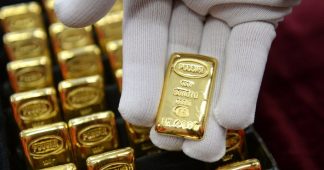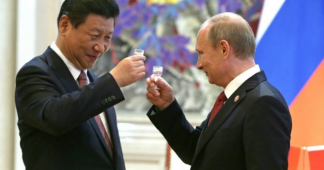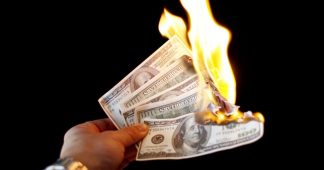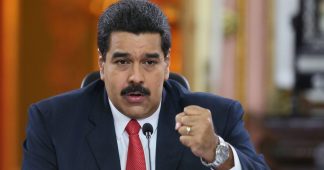Anti-imperialist Alliance
Tobias Pfennig
Today I would like to speak about “The failure of the soviet economy and the global domination of the petrodollar”. While we are nowadays facing multiple economic difficulties trying to establish independent or even socialist economies, I am sure that to be successful, we must study and learn from history – especially the failure of the soviet economy, but also its success.
During its existence the whole soviet bloc was suffering under a massive shortage of foreign currency. In the former GDR we were manufacturing goods on world class level like microchips from Carl Zeiss, computers from Robotron and Hi-fi. Many of these products were rebranded and sold as premium products in western countries. Despite we were leading the world market on technology in many sectors, we were selling our goods below the market prices, to obtain foreign currency.
How did the US dollar come to power?
In 1929 the great depression shook the world. All countries, abolished the gold standard of currencies, because there wouldn’t have been enough gold to payoff everybody. People began to rush to the banks to exchange change their money for gold while the markets were crashing, and inflation hit the currencies.
So, in 1933 US president Roosevelt straightforwardly nationalized all the gold in the country, forcing people to sell it to the national treasury and making the possession of it illegal. And by 1948, the US held 22 thousand tons of gold – an astonishing 75 percent of all the gold held worldwide by central banks1 – making the dollar the most gold backed and therefore most trusted currency in the world. Additionally, Northern America together with Europe controlled 91 percent of the global export market share2. With this the USA was able to set up the Bretton Woods System after the Second World War, which included the creation of the IMF and the world bank.
The USA was back then promising that its printed paper again had a value, because they ensured its convertibility to gold. The rest of the world accepted the system, which implied that all bilateral trade is made in US dollar at fixed exchange rates. The US dollar then could be exchanged for gold if needed. This meant all currencies or goods had to be exchanged for US dollar and then to another currency or good. At that point the USA started to become the new leading super-power of the world.
While countries started to trust the new system, the USA realized that it doesn’t need to back its currency anymore with gold and so nowadays nobody knows if there is actually any gold left in Fort Knox. And when in the 1960s the French president De Gaulle made use of this exchange possibility and ordered all the US dollar as gold back to France it was already clear that the dollar is in fact not anymore gold backed at all. Again, states began to rush to get their gold back. And to avoid the devaluation of the dollar the USA had to drop the gold standard again in 1971. But the global markets continued to trade based on US dollars.
Why is the independence from the US dollar this important?
Building an independent or planned economy we are always facing the same attacks. The economy is used as a political tool to achieve the goals of the players, which are leading the markets and politics. And Russia learned that once again after the crisis in Ukraine in 2014.
Since 2014 Russia is suffering an ongoing economic crisis, which was a direct result of the political events, which happened in Ukraine. The West imposed sanctions on Russia limiting the possibility of trade and at the same time the oil price was starting to drop massively. The USA and the European Union had one direct goal with these measures: The devaluation of the Russian ruble and damaging the Russian economy – and it worked. The value of the ruble in exchange for the US dollar fell by more than half of its value and the Russian foreign exchange reserves were shrinking in the following months by one third. This is where we are once again experiencing the problem of the US dollar as reserve and exchange currency. But we are also experiencing the strategic importance of the global oil market and the control of it.
Why is the oil market so important?
In 2013 Oil exports together with gas made up more than 68%3 of the whole exports from the Russian Federation. Compared to the amount of less than 10%4 by the USA this is enormous. So, we can say that Russia is directly relying on the export of oil in order to acquire foreign currency. With the drop of the oil price the possibility to obtain foreign currency was reduced.
Interestingly, this is not the first time this happens to Russia. In 1980 petroleum was a source of 56% of all Soviet hard currency earnings. And when in the beginnings of the 1980s the oil glut created a surplus of oil on the world markets the price began to drop. Like today the OPEC members tried to lower the production rates to stabilize the price. But in 1985 the Saudis increased their output to regain market share and the oil price completely collapsed. The oil price fell from 30 dollars per barrel to less than 10 within months, while the demand actually kept growing. A very similar situation like today.
Directly after Crimea returned to Russia in 2014, Michael Reagan the son of former US president Ronald Reagan wrote an article, where he stated:
“I suggest that President Obama might want to study how Ronald Reagan defeated the Soviet Union. He did it without firing a shot, as we know, but he had a super weapon – oil. […] Since selling oil was the source of the Kremlin’s wealth, my father got the Saudis to flood the market with cheap oil. Lower oil prices devalued the ruble, causing the USSR to go bankrupt, which led to perestroika and Mikhail Gorbachev and the collapse of the Soviet Empire.”
Two months after the article was published in 2014, the oil price started to collapse until reaching its bottom at one third of its value. Saudi Arabia as world’s biggest exporter of crude oil with 20% market share6 has a significant impact on the market. But the USA also started to massively export oil. Since the beginning of the Euromaidan in end of 2013 the USA increased its oil exports by an astonishing 1500% reaching more than 1.5 million barrels per day7. Additionally, since 2011 it managed to double its field production from 5 million to 10 million barrels per day8. This massive rise in production was made possible by fracking and now half of the oil being produced in the USA is shale oil9. Within years the USA became a top 10 oil exporter again.
All of this with massive consequences for countries like the Russian Federation or Venezuela. Venezuela has the biggest oil reserves in the world10 and tried to use its oil exports to create wealth for its population. But the problem is that on one hand 90% of all exports of Venezuela are made up of petroleum11 and on the other hand, Venezuela is relying to imports for more than 70% of its food consumption12. So, it is no wonder that after the oil price collapse the Venezuelan foreign currency reserves are going towards zero and people are standing in the shops in front of empty shelves.
Which implications do these facts have to our economic ideas?
We can see some points, which are absolutely necessary to build an independent or socialist economy.
- A stable trade balance of imports and exports.
- The exports must be diversified and made up of goods from as many different sectors as possible to survive possible market crashes.
- The standard of the traded goods must meet the latest standard of the global market.
- Self-sufficiency or autarky must be one core element to avoid dependence on foreign markets, but foreign markets may not be completely abolished, because they are necessary for development.
- The oil price must be brought under control.
- The trade in foreign exchange must be brought under control and the trade in US dollar abolished.
- Trade must be perceived as political tool.
- A new economic system must be invented instead of a return to the gold standard.
Of course, our main goal must be to bring the US dollar as reserve currency to its fall. Finally, this year Russia and China started bilateral trade without the US dollar in Ruble to Yuan13. This is a good first step. But, we must understand that trade is not a simple exchange of goods. It is a powerful political tool. So, we need a platform which is in favor of “political trade”. Especially foreign trade is creating dependencies. This dependency of trade can only work by establishing common political goals. The easiest way to find these partners is by looking at these countries, which are nowadays under embargo or boycott by the West, the USA, European Union, and NATO countries.
My organization the “Anti-imperialist Alliance” is actively working into this direction, to find possibilities for such a trade between anti-imperialist countries. Recently I discussed with the Syrian president Bashar al-Assad the possibility of trade between Syria and the Donetsk and Lugansk People’s Republic. My comrades in Syria and Donbass hope to start this trade in the coming year. The common trade should also create long term political ties. This is why we think it is absolutely necessary to support the Yemeni people in their fight against Saudi-Arabia and US imperialism, not only from a humanitarian perspective, but also from a strategic perspective to put pressure on Saudi-Arabia. Despite the Saudis decided before some months to rise the oil prices again – and this decision was actually made before the internal purge – I don’t think that Saudi-Arabia can be a long term political or economic ally.
So, as already mentioned before I think a return to the gold standard cannot be our goal. But we are still in need of a currency, which is accepted by international partners for trade between countries within an economic sphere. So jokingly we can ask should we use the Bitcoin? Of course, we shouldn’t, but the question is serious. The only thing, which gives value to these digital currencies except for speculation is believe. The same believe system, which first brought gold and then the US dollar to power. So, we need to understand that currency is a believe system.
What has enough accountability to convince people of a new way of trade?
I think it is the role, which Russia and China are more and more playing in the world. Since its intervention in Syria, Russia is being increasingly perceived as factor for stability, voice of the oppressed and “Peacemaker”. Many countries in problematic political situations are looking nowadays towards Russia and they are asking for advice and help. And often Russia feels like that it is asked too much. But maybe Russia shouldn’t see this as excessive demand, but instead as sign of trust.
In 1963 the Council for Mutual Economic Assistance (Comecon) managed to put forward the “transfer ruble”, a virtual currency, which was meant to be used for mutual trade between the member countries. This currency had the advantage to allow foreign trade without creating a common currency and without the US dollar in between. Of course, the currency was mainly intended for balancing trade between the member countries. But placed under an international supervision of partner countries a similar currency could in fact lead nowadays towards a replacement of the status quo. The success of such a reinvented project is only limited by the amount of goods, which is traded within this system and the number of member countries.
Especially nowadays, while the USA and the European union is trying to block the possibilities of trade to hurt independent economies and states, I think we need again a similar system – an easy possibility to create trade between countries with common interest, who want to preserve their economic independence. Countries, which do not want to become part of a forced economic union and which do not want to abolish their local currencies and sovereignty. Countries which are no longer willing to accept the super power of the USA and their dollar… Countries, which are united in their struggle against imperialism.
Therefore, I think that it is necessary to recreate such an economic system and finally end the hegemony of the US dollar.
* Text of a speech delivered at the International Conference on Alternatives to Financial Capitalism, held in Chisinau, Moldova 12-13 December 2017











